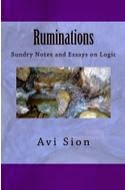RUMINATIONS:
Sundry notes and
essays on Logic.
Avi Sion, Ph. D.
First published, 2005. Expanded edition, same year.
Abstract
Ruminations
is a collection of sundry notes and essays on
Logic. These complement and enrich the author’s past writings, further
analyzing or reviewing certain issues.
Among
the many topics covered are:
- the importance of the laws
of thought, and how they are applied using the logic of paradox;
- details of formal logic,
including some important new insights on the nesting, merger and splitting
up of hypothetical propositions;
- details of causal logic,
including analogical reasoning from cause to cause;
- a cutting-edge
phenomenological analysis of negation.
Additionally,
this volume is used to publish a number of notes and essays previously only
posted in the Internet site The Logician, including a history of Jewish logic
and an analysis of Islamic logic.
Buy it or read it online
All of Avi Sion’s published books can be purchased at Amazon.com
(in paperback or kindle/.mobi form), and at Lulu.com (in
hardcover, paperback or e-book/.epub form), as well as other online stores.
They can also be read online free of charge, chapter by
chapter, at www.TheLogician.net and,
in '3D flipbook' format, at www.AviSionBooks.com,
as well as in Google Books and other Internet locations. They are also available in many
university and public libraries.
Contents in brief
1. About
the Laws of Thought
2. About
Induction
3. About
Words
4. About
Formal Logic
5. About
Paradoxes
6. About
“Modern Logic”
7. About
Cognitive Development
8. About
Causal Logic
9. About
Negation
10. Jewish
Logic: A Brief History and Evaluation
11. Islamic
Logic
12. Logical
Aspects of Foucault's "Archeology"
13. Comments
on 3 chapters of Foucault
14. Bolzano's
Semantics Concepts
Contents in detail
1.
ABOUT THE LAWS OF THOUGHT
1.
Dialectical Reasoning
2.
Genesis of Axioms
3.
Paradoxical Propositions
4.
Contradiction
5.
Varieties of Contradiction
6.
Double Standards
7.
Special Status of the Laws
8.
Motors of Rational Thought
9.
Cogito, Ergo Sum
10.
Concerning Identity
2.
ABOUT INDUCTION
1. Critical
thought
2. Misappropriation
3. Evidence
4. Detail
5. Seems
and Is
6. Adduction
7. Pertinence
8. Trial
and Error
9. Field
Specific
10. The
Human Factor
11. Theorizing
12. Approaching
Reality
13. Experiment
14. The
Uncertainty Principle
15. Epistemic
Ethics
16. Phenomenology
17. Appearance,
Reality and Illusion
18. Existence
and Non-existence
19. Philosophy
and Religion
3.
ABOUT WORDS
1. Meaning
2. Traditional
Distinctions
3. Logic
and Linguistics
4. Dialogue
5. Poles
of Duality
4.
ABOUT FORMAL LOGIC
1. Form
and Content
2. Singular
Subject
3. Special
Forms
4. Fuzzy
Logic
5. Added
Determinants
6. Relational
Expressions
7. Disjunction
8. Material
and Strict Implication
9. Nesting
of Hypotheticals
10. Compound
Theses
11. Validation
of Nesting
12. Brackets
in Logic
5.
ABOUT PARADOXES
1. On
the Liar Paradox
2. Making
No Claim
3. Nagarjuna’s
Trickery
4. Non-apprehension
of Non-things
5. A
Formal Impossibility
6. The
Analytic/Synthetic Dichotomy
7. On
the Russell Paradox
8. An
Illustration of Russell’s
9. On
Grelling’s Paradox
6.
ABOUT “MODERN LOGIC”
1. A
School of Logicians
2. Alleged
New Methods
3.
Non-Aristotelian
“Logic”
4.
Postmodern
“Logic”
5. Mere
Manipulations
6. Thinking
Reflexively
7. Conventional
Logic
8. Absolute
Truths
9. Untouched
by Consciousness
10. Logical
Atomism
11. Exclusive
Judgments
12. Empty
Terms
7.
ABOUT COGNITIVE DEVELOPMENT
1. The
Fourth R
2. Empirical
Studies
3. Piaget’s
Model
4. Piaget’s
Experiments
5. Lines
of Inquiry
6. Experimental
Techniques
7. Private
Languages
8.
ABOUT CAUSAL LOGIC
1. Induction
of Causatives
2. True
of All Opposites
3. Extensional
to Natural
4. Hume’s
Denials
5. Hume’s
Mentalism
6. Constant
Conjunction
7. Billiard
Balls
8. Against
Kant on Freewill
9. Alleged
Influences
10. Analogical
Inferences
9.
ABOUT NEGATION
1. Negation
in Adduction
2. Positive
and Negative Phenomena
3. Positive
Experience Precedes Negation
4. Negation
is an Intention
5. Formal
Consequences
6. Negation
and the Laws Of Thought
7. Pure
Experience
8. Consistency
is Natural
9. Status
of the Logic of Causation
10. Zero,
One and More
11. Psychology
of Negation
12. Negation
in Meditation
10.
JEWISH LOGIC: A BRIEF HISTORY AND EVALUATION
1. Introduction
2. Traditional
Claims and Historical Record
3. Comparisons
and Assessments
11.
ISLAMIC LOGIC
1. The
Structure of Islamic Law
2. Islamic
Hermeneutics
3. Interpreters
12.
LOGICAL ASPECTS OF FOUCAULT’S ARCHEOLOGY
1. Slippery
2. Catch
Him
3. Healing
13.
COMMENTS ON 3 CHAPTERS OF FOUCAULT
1. Las
Meninas
2. The
Prose of the World
3. Representing
14.
BOLZANO’S SEMANTICS CONCEPTS
1. “Propositions-in-Themselves”
2. “Ideas-in-Themselves”
3. The
Issue of Time
(Note: As of 2008, the
section headings in chapters 1-9 were added in for the reader’s convenience.
Moreover, three essays originally included in this book were omitted from it,
viz.: “J. S. Mill’s Methods” (2005), which was put with The Logic of Causation; and “Addenda to Judaic Logic” (1997-2005)
and “Diagrams for Judaic Logic” (2005), which were put with Judaic Logic. The remaining few chapters
were then renumbered 10-14.)

No comments:
Post a Comment